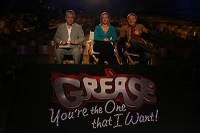Time for me to weigh in seriously on the whole Iraq "surge" thing. Yes, I’m just another twitter in the cacophany of pundits, commenters, analysts, and armchair generals — but here I am.
Now I didn’t see the speech (I heard a later recording) so I won’t comment on the theatrics of his delivery. I’ll leave that to Howard Fineman of Newsweek:
George W. Bush spoke with all the confidence of a perp in a police lineup. I first interviewed the guy in 1987 and began covering his political rise in 1993, and I have never seen him, in public or private, look less convincing, less sure of himself, less cocky. With his knitted brow and stricken features, he looked, well, scared. Not surprising since what he was doing in the White House library was announcing the escalation of an unpopular war.
What the voters saw on TV just now was a man struggling to come to grips with his own unwillingness to face facts. It’s still a struggle. His acknowledgement of mistakes was oblique and not as brave as it sounded at first blush. Mistakes were made, and he said. "The responsibility rests with me," he said. What he meant to convey was that others had made the mistakes, but that he was stepped up to take the hit. Hoo-aw! He said that he had "consulted" congressional leaders of both parties before he came to a decision on sending more than 20,000 additional troops. He didn’t really consult with members of Congress, and certainly not with Democrats, unless you consider Sen. Joe Lieberman a Democrat.
Yikes. That bad?
Anyway, a few slightly organized thoughts about the substance of the surge plan:
(1) People need to realize that when Bush speaks about adding another 21,500 troops, he’s not really going to be adding an additional 21,500 combat forces. Generally, only one in four "troops" constitute combat forces — the rest are support personnel (mechanics, etc.). So, at best, we’re adding 6,000 actual combat forces into Iraq.
Is this enough to make a difference? No.
Consider the island of Manhattan. That has a police force of 45,000. And that’s just 10 square miles. Iraq, on the other hand, is thousands of square miles. What will the addition of 6,000 combat forces do in a region that size? Very little.
Granted, most of the sectarian violence is limited to Baghdad and outlying provinces. But 6,000 combat forces — if they have any effect at all — will merely serve to relocate the violence in other parts of Baghdad, or in further outlying provinces.
Look. Just last month, the US Army came out with its first ever counter-insurgency manual, and it makes this clear point: the ideal ratio of troops to population in a counter-insurgency operation is 20 per 1,000. Iraq’s population is 26 million. This would imply the US would need to add at least 250,000 to its existing force of 140,000 – a logistical and political impossibility.
So I disagree with the metaphor that this is Bush’s "hail mary" pass. Hail Mary passes are looong passses. This is a short passes from his own 20 yard line.
After the whistle has blown.
(2) Bush also talked about a change in military strategy — not just more boots on the ground, but allowing those boots to go into areas in which they were formally forbidden to go.
Prior to now, U.S. and Iraqi troops would go into violent areas, secure them, and then leave. Naturally, as soon as we left, the violence sprouted up again.
Bush’s strategy this time appears to be "clear and hold" — where we go into violent areas, secure them, and stay there. This makes sense in a situation in 20th century warfare, where the "enemy" is a soldier in uniform, clearly identifiable. Not so much in guerrilla warfare, where the "enemy" could be anybody. What we’ll see is a slow attrition of our forces there, as small potshots and IEDs pick them off one-by-one. With the enemy both in plain sight, and not in sight at all, we can’t ever keep any neighborhood secure by "clearing" out the bad guys, since we won’t know who they are.
So instead, we’ll be perpetual targets.
(3) People should also realize that the 20,000+ increase in troops does not mean we will be getting 20,000+ fresh troops. Part of the way the "increase" will come about is to extend tours of duty for soldiers who are already there — tired men and women. Not a good thing.
(4) Also, even with the surge, the number of troops will still be less than what we had in Iraq in 2005 [We had 160,000 troops in November 2005; we have 140,000 there now — a surge will take us to just over 160,000].
If we couldn’t accomplish "victory" then, what makes anybody think it will be different now, when the insurgency is even bigger?
(5) Bush was correct in saying that ultimately, the Iraqis have to step up to the plate and secure their own country. However, by providing more "support", we send the exact opposite message. It’s sort of like telling a welfare recipient that they should go out and find a job, but giving them more and more money. Disincentive.
Furthermore, the Shiite-dominated Iraqi government simply have not stepped up to the plate when required. Just two months ago, our National Security Advisor said:
"…the reality on the streets of Baghdad suggests Maliki is either ignorant of what is going on, misrepresenting his intentions, or that his capabilities are not yet sufficient to turn his good intentions into action.”
Last year, for example, the Iraqis agreed to contribute six battalions — about 3,000 soldiers — to a joint security operation in the capital called Operation Together Forward. Only two battalions showed up, according to the bipartisan Iraq Study Group. And only one was combat-ready.
What makes anybody think it will be different this time?
(6) I still have no idea what the metric for "success in Iraq" means. Is it possible to extinguish all sectarian violence in Iraq? No. This is a hornet’s nest, and there simply is no way to put the hornets back in the hive. There’s no way to unscrew the pooch. There’s no way to put the toothpaste back in the tube. As Ollie North and others are saying, all you are doing now is putting more American lives in danger, with no payoff.
(7) The most troublesome part of Bush’s speech was this:
Succeeding in Iraq also requires defending its territorial integrity and stabilizing the region in the face of extremist challenge. This begins with addressing Iran and Syria. These two regimes are allowing terrorists and insurgents to use their territory to move in and out of Iraq. Iran is providing material support for attacks on American troops. We will disrupt the attacks on our forces. We will interrupt the flow of support from Iran and Syria. And we will seek out and destroy the networks providing advanced weaponry and training to our enemies in Iraq.
Now, it seems clear that we can’t allow Iran and Syria to take advantage of the turmoils in Iraq. And Bush is right that we need to "address" those two countries. But immediately, President One-Track-Mind jumps to the military solution, totally avoiding the political solution, the international pressure solution, the diplomatic solution, the sanction solution, or a combination of all of the above.
This is a playground presidency, where the only answer to international problems is to blow shit up. It seems to me, and I’m not the only one, that Bush’s "revised plan" is to baby sit Iraq until we can go find some other country to bomb.
[UPDATE: Well, that didn’t take long. We’re already starting our fight with Iran.]In other words, the flop known as the Iraq War is going on tour. Ugh.
(8) Another Bush line:
The challenge playing out across the broader Middle East is more than a military conflict. It is the decisive ideological struggle of our time.
I have a hard time with this rhetoric.
If this truly is the "decisive ideological struggle" of our time, shouldn’t he be calling upon Americans to sacrifice? Shouldn’t he be raising taxes to pay for this war? Or be bringing back the draft?
Bush suffers from a disingenuity problem simply because with one hand, he makes this conflict out to be as if our survival depends on it. But with the other hand, he wants us to keep shopping at Walmart as if nothing is going on. No wonder he’s not connecting with the American people.
(9) To listen to Bush last night, one might come away with the impression that al Qaeda (the people that attacked us on 9/11) are all over the place in Iraq. But we must never ever lose sight that, while al Qaeda was responsible for 9/11, the conflict in Iraq has nothing to do with al Qaeda. As Middle Eastern expert Juan Cole points out, al Qaeda has little presence in Iraq:
And the main problem is not "al-Qaeda," which is small and probably not that important, and anyway is not really Bin Laden’s al-Qaeda. They are just Salafi jihadis who appropriated the name. When their leader, Abu Musab al-Zarqawi, was killed, it didn’t cause the insurgency to miss a beat. Conclusion: "al-Qaeda" is not central to the struggle.
(10) We all remember the blind faith at the beginning of the war, don’t we? Where we would be "greeted as liberators" and the grateful Iraqi public would throw flowers at our feet?
There was no empirical evidence for that — it was just a belief held by the Bush Administration. The New York Times this morning shows that blind faith still is in abundent supply at the White House:
He put it far more bluntly when leaders of Congress visited the White House earlier on Wednesday. “I said to Maliki this has to work or you’re out,” the president told the Congressional leaders, according to two officials who were in the room. Pressed on why he thought this strategy would succeed where previous efforts had failed, Mr. Bush shot back: “Because it has to.”
Because it has to?
Clap harder everybody, and Tinkerbell will live.
(11) Small point, but a point that needs making. Bush said:
"Where mistakes have been made, the responsibility rests with me."
Just for the record, that’s not an admission that he made mistakes. It’s saying that he’s taking responsibility for others’ mistakes.
(12) So what’s the answer to the Iraq quigmire?
Well, I think — hard as it might be for some — that we have to acknowledge that the tube is out of the toothpaste, and the pooch — once screwed — cannot become unscrewed.
But if leaving would be a disaster, dicking around for nine months and then leaving would be somewhat more of a disaster.
We have to cut our losses with respect to Iraq. Our presence there only fuels the problem, not only in Iraq, but regionally. Logistically, we can’t go to war with the entire Middle East.
And Iraq itself needs to be taken off the U.S. military teet. If they ever are to stand up, it will only be after we stand down.
This does not mean abandoning the Middle East militarily — we still have unfinished work in Afghanistan. Nor does it mean forgoing putting military pressure on Iran and Syria. But all these things need to be done in conjunction with the international community of nations, and there must be a parallel track of diplomacy and negotiation — especially with Iran and Syria.
I’m still on the fence about the "Democratic" response in Congress (although, to be honest, the nay-sayers to the Bush revised strategy include many hawkish Republicans and military men). I think it is political folly to withhold funds from the troops themselves — after all, if they are ordered to fight, we want them to have body armor, etc. I think the symbolic resolution being proposed — the one saying "no" to Bush’s new plan — is a nice start, but it will be, at the end of the day, just that: symbolic.
There is the larger question of whether Congress can revoke its resolution, passed in the days of 9/11, authorizing President Bush to go to war. My earlier research (and admittedly, it’s been a few years) suggested that they can, and if so, they should.
At this point, the U.S. cannot "win" (whatever that means) in Iraq, but we can make it worse by staying there and breeding the kind of anti-U.S. sentiment that led to 9/11 in the first place. That’s not just me saying that — that’s the most recent National Intelligence Estimate (the assessment of the country’s combined military intelligence agencies). Creating more extremism and zealots is not in our best interest. Time to pull out. We got Saddam — let’s hang our hat on that victory, and begin anew our efforts to deflate Islamic extremism.
UPDATE: A new Washington Post-ABC News poll conducted following the President’s speech finds broad and strong opposition to his call to send about 21,500 more troops to Iraq: 61 percent oppose the force increase, with 52 percent "strongly" opposing the build-up. Thirty-six percent support the additional troops; only one-quarter of the public is strongly supportive.
Worse still is the AP poll:
Fully 70 percent of Americans oppose sending more troops, and a like number don’t think such an increase would help stabilize the situation there. The telephone survey of 1,002 adults was conducted Monday through Wednesday night, when the president made his speech calling for an increase in troops. News had already surfaced before the polling period that Bush wanted to boost U.S. forces in Iraq.
The Iraq situation continued to be drag on Bush’s overall job approval rating, which stood at 32 percent, a new low in AP-Ipsos polling.
The last word to Keith Olbermann, who catalogues the missteps of Bush regarding Iraq, and why he simply cannot be trusted:
President Bush makes no secret of his distaste for looking backward, for assessing past results.
But in our third story on the Countdown tonight… too bad.
Any meaningful assessment of the president’s next step in Iraq must consider his steps and missteps so far.
So, let’s look at the record:
Before Mr. Bush was elected, he said he was no nation-builder; nation-building was wrong for America.
Now, he says it is vital for America.
He said he would never put U.S. troops under foreign control. Today, U.S. troops observe Iraqi restrictions.
He told us about WMDs. Mobile labs. Secret sources. Aluminum tubing. Yellow-cake.
He has told us the war is necessary…Because Saddam was a threat; Because of 9/11; Osama bin Laden; al Qaeda; Because of terrorism in general; To liberate Iraq; To spread freedom; To spread democracy; To keep the oil out of the hands of terrorist-controlled states; Because this was a guy who tried to kill his dad.
In pushing for and prosecuting this war, he passed on chances to get Abu Musab al-Zarqawi, Muqtada al-Sadr, Osama bin Laden.
He sent in fewer troops than recommended. He disbanded the Iraqi Army, and "de-Baathified" the government. He short-changed Iraqi training.
He did not plan for widespread looting, nor the explosion of sectarian violence.
He sent in troops without life-saving equipment.
Gave jobs to foreign contractors, not the Iraqis.
Staffed U-S positions there, based on partisanship, not professionalism.
We learned that "America had prevailed", "Mission Accomplished", the resistance was in its "last throes".
He has said more troops were not necessary, and more troops are necessary, and that it’s up to the generals, and removed some of the generals who said more troops would be necessary.
He told us of turning points: The fall of Baghdad, the death of Uday and Qusay, the capture of Saddam, a provisional government,the trial of Saddam, a charter, a constitution, an Iraqi government, ¤elections, purple fingers, a new government, the death of Saddam.
We would be greeted as liberators, with flowers.
As they stood up–we would stand down, we would stay the course, we were never ‘stay the course’,
The enemy was al Qaeda, was foreigners, terrorists, Baathists.
The war would pay for itself, it would cost 1-point-7 billion dollars, 100 billion, 400 billion, half a trillion dollars.
And after all of that, today it is his credibility versus that of generals, diplomats, allies, Republicans, Democrats, the Iraq Study Group, past presidents, voters last November, and the majority of the American people.
OKAY, THE REAL LAST WORD: Inadvertantly, a game show contestant gives the proper response to the Bush speech last night —








